
POKORNÝ, P. & KONOPÁSEK, Z. (2020): Lítáme v tom - I.: Dialog o klimatu na pomezí vědy, politiky a aktivismu. Kontexty, 12 (5): 30-39 (přetištěná první část textu, který byl napsán pro sborník Musí být ekologie alarmistická?). Dostupné na adrese https://casopiskontexty.cz/litame-v-tom-i/
::::První část. Paleoekolog Pokorný a sociolog Konopásek, jinak blízcí akademičtí kolegové, rozmlouvají o některých obecnějších souvislostech vědeckého pochybování nad současnou klimatickou politikou. Začínají u rozpaků přírodovědce nad tím, co si počít s ostře odmítavými až útočnými reakcemi širší veřejnosti vůči prezentaci odborného mínění, které jednoduše nezapadá do současného populárního kánonu. Tyto reakce nemají typicky charakter věcné disputace, ale dotýkají se přímo a výslovně osobní integrity, morálky a politického přesvědčení. Patří tohle do vědy? A pokud ano, tak jak? Co si má badatel s tímto rozměrem veřejné debaty počít? Paleoekolog se s takovými otázkami obrací na sociologa vědy, u kterého tuší nalézt porozumění. Sociolog se snaží naznačit komplikované rozhraní mezi vědeckým a politickým, jakož i choulostivost vztahů mezi odborným odstupem od věci a angažovaným ponorem do ní. Čerpá přitom nejen ze specifických zkušeností sociologa vědy, ale často dává na první pohled odtažité příklady z šířeji pojaté oblasti sociálních věd.
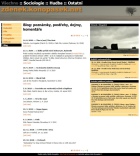
KONOPÁSEK, Z. (2017): K fenoménu Antropocén: Poznámky na okraj mezioborové debaty. Blog Zdeňka Konopáska, 22. 7. 2017. Dostupné na adrese http://zdenek.konopasek.net/index.php?m=16&b=16&i=3609
::::V Centru pro teoretická studia UK/AV ČR jsme začátkem roku 2017 začali probírat pojem antropocénu. Tímto slovem se nejčastěji vyjadřuje, že žijeme v epoše, ve které se člověk stal zásadní a hlavní silou, která formuje podobu planety. Antropocén je tedy název pro novou geologickou éru Země. V tomto textu se přimlouvám za složitější a širší chápání antropocénu – takové, které by otevíralo prostor pro mezioborovou diskusi. Jde o pracovní text, náčrt: připomínky a komentáře vítány. Pokud byste náhodou chtěli citovat, ujistěte se, že se mezitím neobjevila definitivní, oficiálně publikovaná verze.
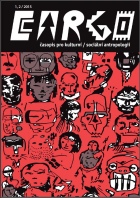
BROŽ, L. / STÖCKELOVÁ / KONOPÁSEK, Z. (2015): Symetrie je často stranická: rozhovor se Zdeňkem Konopáskem. Cargo, 13 (2): 117-132
::::

KONOPÁSEK, Z. (2014): Siting case studies. Topical report - working paper of the InSOTEC project (WP 2). Available at http://www.insotec.eu/publications/topicalreports
::::The InSOTEC case studies related to siting repositories of high-level radioactive waste do not and cannot come up with simple solutions or recipes. Rather, they suggest, more or less directly, that a slightly more reflective way of addressing sociotechnical tensions and complexities would be beneficial. During the controversies described, quite often one party claimed that a certain problem was ‘purely technical’ or ‘purely social’. However, just as often it was possible to successfully doubt such a claim and take it as a sign of a suspicious and unconvincing strategy of the opponent, because the issues were all so obviously entwined. The contribution of these case studies might consist in offering us an enhanced understanding of what occurs on the borderline between the ‘social’ and the ‘technical’. To talk about the sociotechnical challenges of deep geological disposal of nuclear waste would then mean to reflect on sociotechnical complexities – their highly specific, situated and, in a way, irreducible nature – but also, at the same time, preserve a sensitivity towards and understanding of the fact that these complexities are made manageable in practice by means of various simplifications and purifications. This is a difficult (seemingly contradictory) point with subtle political consequences, to which the cases presented hopefully provide at least some empirical background.
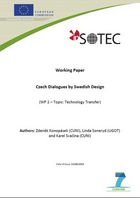
KONOPÁSEK, Z. / SONERYD, L. & SVAČINA, K. (2014): Czech Dialogues by Swedish Design. Working paper of the InSOTEC project (WP 2). Available at http://www.insotec.eu/publications/topical-reports
::::Transferring an elaborate design to a different setting is always an intricate business with uncertain results. This report takes this well-known lesson as a starting point for a study of the travel of a ready-made design for public dialogue on geological disposal. We want to discuss how established participative procedures are made to travel from one national context to another under the auspices of the EU and what the limits and consequences of such transfers are. The interesting thing for us is not only how the target setting is changed or not by the newly introduced practices, but also how the relatively well established participatory “technology” is itself being transformed during its transmission and implementation. Successes and failures of such a transfer have to be seen and assessed against the background of these mutual accommodations, translations and betrayals. Thus, our general interest is the fragility and ambiguous results of intentional and systematic spread of technical democracy across national and political contexts. More precisely, we will follow and critically discuss the story of how a Swedish design for public dialogues called RISCOM was transferred to the Czech Republic. We are going to show that, on the one hand, RISCOM made an important achievement in the Czech case, since it helped to bring all the main actors to a discussion table after previous negotiations had completely crashed. On the other hand, however, it seems that RISCOM substantially failed from a broader perspective. It found its way in the Czech Republic only at the cost of losing its specific original characteristics (and emphasizing new ones, rather controversial). As such, it quickly became associated with only too general appeals to dialogue, the attractiveness of which lived but shortly. It contributed to the increasing focus on dialogue per se, which ultimately led to frustration and impatience on both sides. This recently resulted in the shift toward more authoritative decision making in the Czech Republic and another crisis of mutual trust.
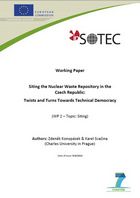
KONOPÁSEK, Z. & SVAČINA, K. (2014): Siting the Nuclear Waste Repository in the Czech Republic: Twists and Turns Towards Technical Democracy. Working paper of the InSOTEC project (WP 2). Available at http://www.insotec.eu/publications/topical-reports
::::We are going to present a story of a double turn: first, the turn toward deliberative procedures orchestrated by the implementer; this turn came after the initial period of expert driven decision making had led to public protests and failed. Second, we describe a turn back toward more authoritative and technocratic decision making after several-years long attempt at “technical democracy”, to use this famous term (Callon, Lascoumes & Barthe 2009), did not bring expected results quickly enough. While the former kind of turn appears relatively frequently in literature, often accompanied by an account of how subsequent deliberation brought about interesting results, the latter does not seem to be discussed too often – although similar failures may not be so rare. This could be related, among others, to the fact, that while the first kind of events documents the need to take “social aspects” of technology into account (and, eventually, an important role of social learning), telling about failing attempts at carefully orchestrated public dialogue (under the auspices of EU projects) complicates the point – which is what we would deliberately like to do in this case study; and by doing so we hope to join the discussion about the limits of participation and about how to “move beyond mere sloganizing over science and democracy”. We want to show that a misunderstanding about the meaning of the notion of “socio-technical” can be seen behind the described double turn. Socio-technical, at least as far as its STS origin implies, does not mean simply just adding a list of “social issues” to the technical agenda. Not in a way in which the two sets of aspects are kept apart, separated and hierarchically ordered as two different kinds of issues to be solved in different spaces and times. And not in a way which is simply based on gathering experts and lay people together so that they may speak to each other and therefore constitute a kind of “socio-technical” discourse. Instead (and in accordance to the work done within STS), the notion of socio-technical refers to analytical determination to approach and understand social and technical processes together, as a single network, i.e., going hand in hand, inseparably (i.e., Callon 1991; Latour 1991 and elsewhere). Something like this, of course, is hard to translate into policy practices and formalized public involvement – which is valid even more for policy cultures that have remained practically untouched by “the emerging interest in scientific citizenship today and multiple new forms of public participation in science and technology” and in which scientific expertise still very much enjoys the status of politically neutral authority, external to societal life. In a way, we are convinced that the siting process in the Czech Republic has fallen victim to the simplified understanding of what “socio-technical” means for technical democracy in the making.
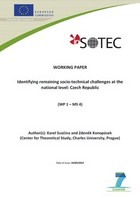
SVAČINA, K. & KONOPÁSEK, Z. (2012): Identifying remaining socio-technical challenges at the national level: Czech Republic. Working paper of the InSOTEC project (WP 1 – MS 4). Available at http://www.insotec.eu/publications/file-cabinet
::::This report describes the history, recent developments and the current situation of the management of highly radioactive waste and spent nuclear fuel in the Czech Republic, with a particular focus on the development of geological disposal for this kind of waste. Special attention is given to the interplay of social and technical aspects of the process. The first chapter gives an overview of the state of affairs and sketches out the trajectories leading to it. The institutional background, legislative framework and relevant government policies, as well as the role of affected communities and other civil society stakeholders are considered. The second chapter tries to identify the main socio-political challenges that the process of geological disposal development is currently facing. By socio-political challenges we mean problems and obstacles that complicate the negotiations between the implementer and other relevant groups, be it other state institutions, municipalities, or NGOs. The third chapter takes these observations a step further, and tries to identify significant socio-technical challenges within this process. By looking at the problems as socio-technical, we want to emphasize and highlight the fact that there is interplay of social and technical aspects, and that it is often problematic or counterproductive to consider them as separate, purely social and purely technical aspects. The ultimate goal of identifying significant socio-technical challenges then is to sketch out problems of interest for case study research in the second work package of InSOTEC.

KONOPÁSEK, Z. (2010): Co znamená "sociální konstrukce"? Blog Zdeňka Konopáska, 3. 11. 2010. Dostupné na adrese http://zdenek.konopasek.net/index.php?m=151&i=1490&b=151
::::Dnes mám v rámci oslav 20-letého výročí oslav Centra pro teoretická studia, stejně jako další kolegové, krátce promluvit na libovolné téma ze svého oboru. Rozhodl jsem se v této mini-přednášce shrnout několik vysvětlení k pojmu, který dnes dělá tak často sociologii ostudu, a přitom by nemusel. Tady je ta řeč písemně.
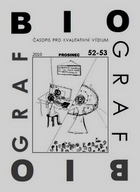
KONOPÁSEK, Z. (2010): V čem spočívá pravda náboženské skutečnosti? Sociologický pohled na mariánská zjevení a démonické posedlosti. Biograf (52-53): 89-101
::::V tomto textu shrnuji východiska a závěry tříletého výzkumného projektu "Jak se dělá náboženská skutečnost: Zjevení a posedlost démony jako praktický a kolektivní výkon" (GAČR 403/08/1758). Opírám se při tom o dosud napsané články, většinou spolu s Janem Palečkem. Stručně: Spojujícím momentem různých našich analýz je mnohotvárnost a praktická různorodost toho, čemu říkáme náboženská víra. Inspirovali jsme se přístupy z oboru současných vědních studií a pokoušíme se o jakousi neredukcionistickou sociologii náboženství. Zvolili jsme za předmět studia podivné, nevšední a v mnoha ohledech sporné situace (zjevení, posedlost), které rozdělují nejen věřící a nevěřící, ale i mnohé věřící navzájem, a které nám umožňují zachytit i tak dlouhodobě a dokonale sedimentovanou skutečnost, jakou je skutečnost náboženská, v pohybu a rozpolcení.

KONOPÁSEK, Z. (2009): Co by nás prý na vědě nemělo šokovat...? Blog Zdeňka Konopáska, 21. 11. 2009. Dostupné na adrese http://zdenek.konopasek.net/index.php?m=151&i=1215&b=151
::::Na okraj jednoho rodícího se "vědeckého skandálu": věda o klimatu přistižená v nedbalkách.
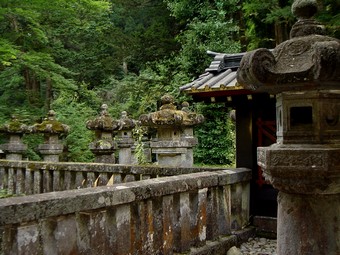
 ? - recenze vyjde v časopise Biograf
? - recenze vyjde v časopise Biograf
 se objevily informace o tom, co lze snad prý během března čekat v nové, sedmé verzi mého oblíbeného analytického programu
se objevily informace o tom, co lze snad prý během března čekat v nové, sedmé verzi mého oblíbeného analytického programu







